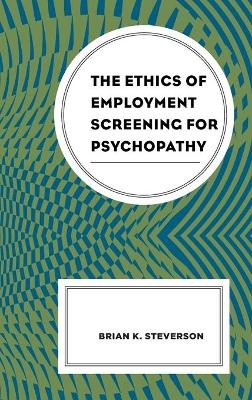
The Ethics of Employment Screening for Psychopathy
Seiten
2020
Lexington Books (Verlag)
978-1-7936-1682-1 (ISBN)
Lexington Books (Verlag)
978-1-7936-1682-1 (ISBN)
This book argues that, despite recent calls to arms to seek out and remove "corporate psychopaths" from the business world, efforts to eliminate the corporate psychopath presence would be illegal as well as unethical.
In 2006, Babiak and Hare alerted the public to the danger of “corporate psychopaths,” psychopathic individuals occupying positions of power in business organizations. Since then, academicians and the public media have advertised their presence, documented the harm they can cause, and issued a call to arms to identify corporate psychopaths and eliminate their presence in the workplace. Very little attention has been paid, however, to the ethics of such a “seek and destroy” mission. The Ethics of Employment Screening for Psychopathy argues that employment screening for psychopathy would be illegal and unethical. On legal grounds, Brian K Steverson argues that psychopathy would qualify as a protected disability under the Americans with Disabilities Act, and, hence, medical screening to identify potential corporate psychopaths would be in violation of the ADA. On ethical grounds, the case is made that such screening would violate a social commitment to equal opportunity, would constitute a morally unjustified violation of personal privacy, and would, in practice, not produce the intended benefits, while at the same time inflicting harm on the subjects of the screening.
In 2006, Babiak and Hare alerted the public to the danger of “corporate psychopaths,” psychopathic individuals occupying positions of power in business organizations. Since then, academicians and the public media have advertised their presence, documented the harm they can cause, and issued a call to arms to identify corporate psychopaths and eliminate their presence in the workplace. Very little attention has been paid, however, to the ethics of such a “seek and destroy” mission. The Ethics of Employment Screening for Psychopathy argues that employment screening for psychopathy would be illegal and unethical. On legal grounds, Brian K Steverson argues that psychopathy would qualify as a protected disability under the Americans with Disabilities Act, and, hence, medical screening to identify potential corporate psychopaths would be in violation of the ADA. On ethical grounds, the case is made that such screening would violate a social commitment to equal opportunity, would constitute a morally unjustified violation of personal privacy, and would, in practice, not produce the intended benefits, while at the same time inflicting harm on the subjects of the screening.
Brian K. Steverson is John L. Aram Chair in Business Ethics in the School of Business Administration at Gonzaga University.
Introduction
Chapter One: Psychopathy Defined
Chapter Two: Corporate Psychopaths: Seek and Destroy
Chapter Three: Psychopathy and the Americans with Disabilities Act
Chapter Four: The Ethical Issues
Conclusion
Bibliography
About the Author
| Erscheinungsdatum | 10.05.2021 |
|---|---|
| Verlagsort | Lanham, MD |
| Sprache | englisch |
| Maße | 161 x 228 mm |
| Gewicht | 395 g |
| Themenwelt | Geisteswissenschaften ► Philosophie ► Allgemeines / Lexika |
| Geisteswissenschaften ► Philosophie ► Ethik | |
| Geisteswissenschaften ► Psychologie ► Persönlichkeitsstörungen | |
| ISBN-10 | 1-7936-1682-5 / 1793616825 |
| ISBN-13 | 978-1-7936-1682-1 / 9781793616821 |
| Zustand | Neuware |
| Informationen gemäß Produktsicherheitsverordnung (GPSR) | |
| Haben Sie eine Frage zum Produkt? |
Mehr entdecken
aus dem Bereich
aus dem Bereich
die letzten Jahre der Philosophie und der Beginn einer neuen …
Buch | Hardcover (2024)
Klett-Cotta (Verlag)
CHF 39,20
Konfuzianismus, Daoismus, Buddhismus
Buch | Softcover (2023)
C.H.Beck (Verlag)
CHF 25,20


